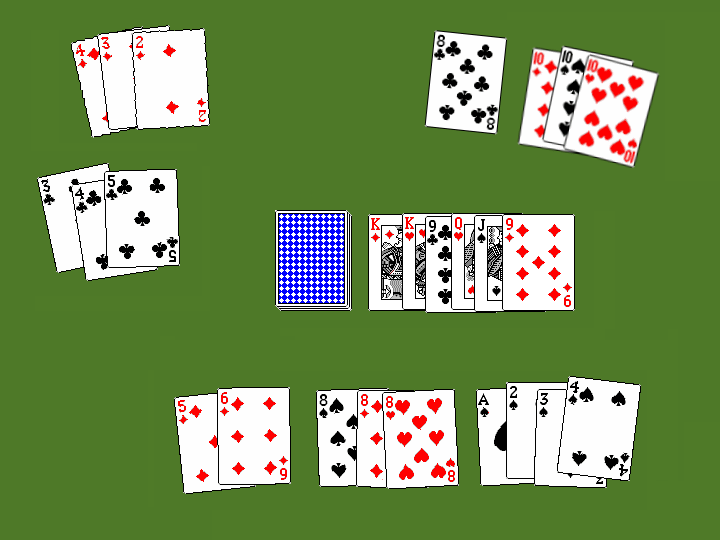
What is Rummy?
Rummy is a popular card game played with a standard deck of 52 cards. The objective is to form sets and sequences by drawing and discarding cards. It's a game of skill that requires strategy, memory, and calculation.
In India, Rummy has several variations including Points Rummy, Pool Rummy, and Deals Rummy. The game can be played between 2-6 players and is enjoyed both casually among friends and in competitive tournaments with cash prizes.
Basic Rules
Game Setup
- The game is played with 1 or 2 standard decks of 52 cards each, plus jokers
- Each player is dealt 13 cards
- The remaining cards form the draw pile, with the top card turned face up to start the discard pile
- A random card is selected as the wild card (joker) for the game
Objective
- Arrange all 13 cards into valid sets and sequences
- A valid declaration requires at least 2 sequences, one of which must be a pure sequence (without jokers)
- The first player to arrange all cards and make a valid declaration wins
Valid Combinations
Sequences
A sequence is three or more consecutive cards of the same suit.
Pure Sequence
A sequence without any jokers or wild cards.
Example: 5♥ 6♥ 7♥
Impure Sequence
A sequence with one or more jokers or wild cards.
Example: 8♠ 9♠ Joker (representing 10♠)
Sets
A set is three or more cards of the same rank but different suits.
Pure Set
A set without any jokers or wild cards.
Example: K♠ K♥ K♦
Impure Set
A set with one or more jokers or wild cards.
Example: Q♣ Q♦ Joker (representing Q♥ or Q♠)
Jokers
Printed Jokers
The cards marked as jokers in the deck. They can substitute for any card to complete a sequence or set.
Wild Card Jokers
A randomly selected card at the beginning of the game. All cards of the same rank become wild cards and can be used as jokers.
Gameplay
Turn Sequence
- Draw a card: On your turn, you must first draw a card either from the draw pile or the top card from the discard pile.
- Arrange your cards: Organize your cards into valid sets and sequences.
- Discard a card: At the end of your turn, you must discard one card to the discard pile.
- Declare: When you have arranged all your cards into valid combinations, you can declare your hand to win the game.
Winning & Scoring
Valid Declaration: To win, you must arrange all 13 cards into valid sets and sequences, with at least 2 sequences, one of which must be a pure sequence.
Points Calculation: If a player makes a valid declaration, other players' unmatched cards are counted as points:
- Face cards (K, Q, J) = 10 points each
- Ace = 10 points
- Number cards = their face value (e.g., 7 = 7 points)
- Jokers = 0 points
Invalid Declaration: If a player declares incorrectly, they receive a penalty of 80 points.
Popular Rummy Variations
Points Rummy
A fast-paced version where each game is played for a fixed point value. The winner gets the points from all opponents based on their unmatched cards.
Pool Rummy
Players start with a fixed number of points (usually 101 or 201). As they lose games, points are added to their score. When a player reaches the maximum points, they are out of the game.
Deals Rummy
A predetermined number of deals are played. After all deals, the player with the lowest points wins.
Gin Rummy
A two-player version where each player gets 10 cards. The objective is to form sets and runs with all cards, with one card discarded.
Tips and Strategies
- Form a pure sequence first: Since a valid declaration requires at least one pure sequence, focus on forming this early.
- Use jokers wisely: Jokers are valuable for completing difficult sets or sequences. Don't waste them if you can form combinations without them.
- Observe discards: Pay attention to what cards your opponents are discarding to understand what combinations they might be forming.
- Discard high-value cards early: If you have high-value cards that don't fit into any potential combination, discard them early to minimize points if another player declares.
- Middle cards are valuable: Cards like 6, 7, 8 can form more sequences than edge cards like 2 or K, so try to keep them.
- Be careful with drawing from the discard pile: When you pick from the discard pile, you reveal information about your hand to other players.